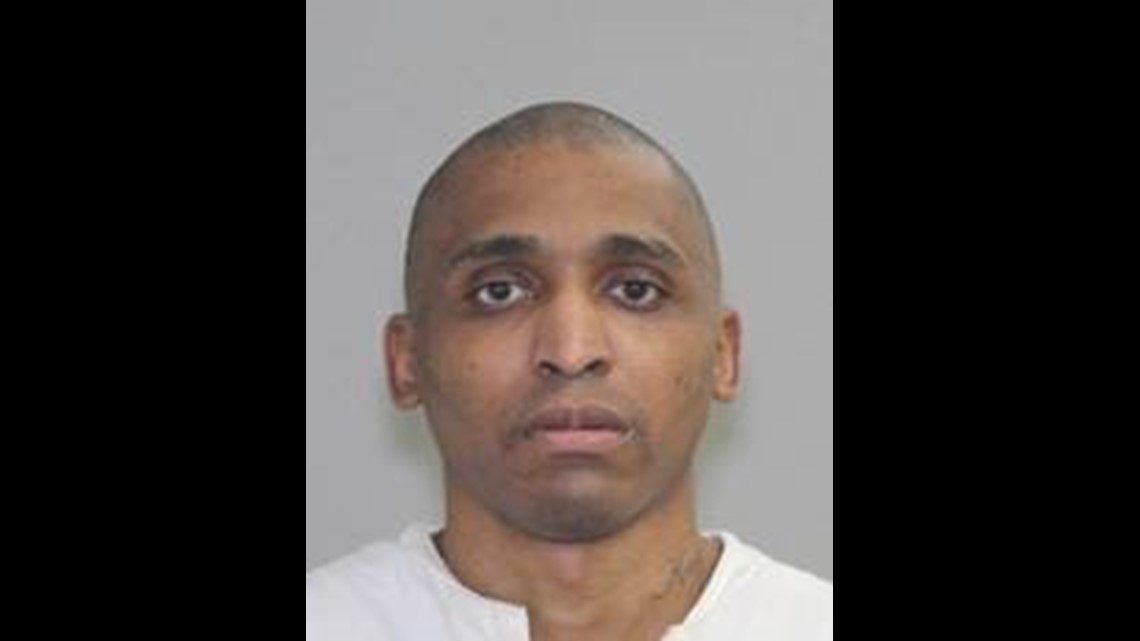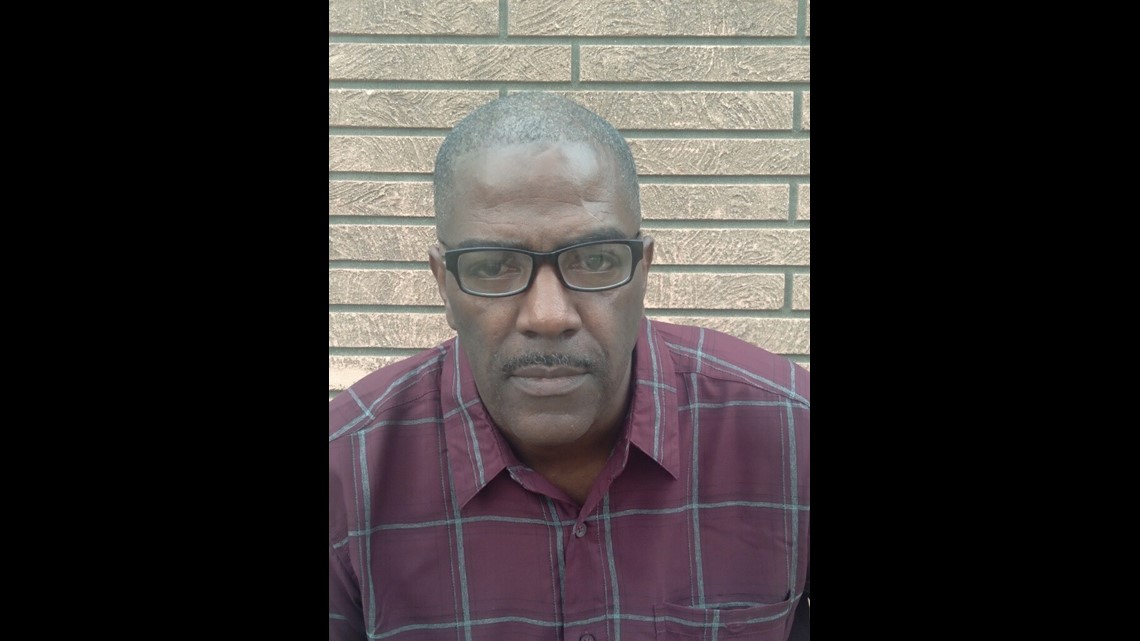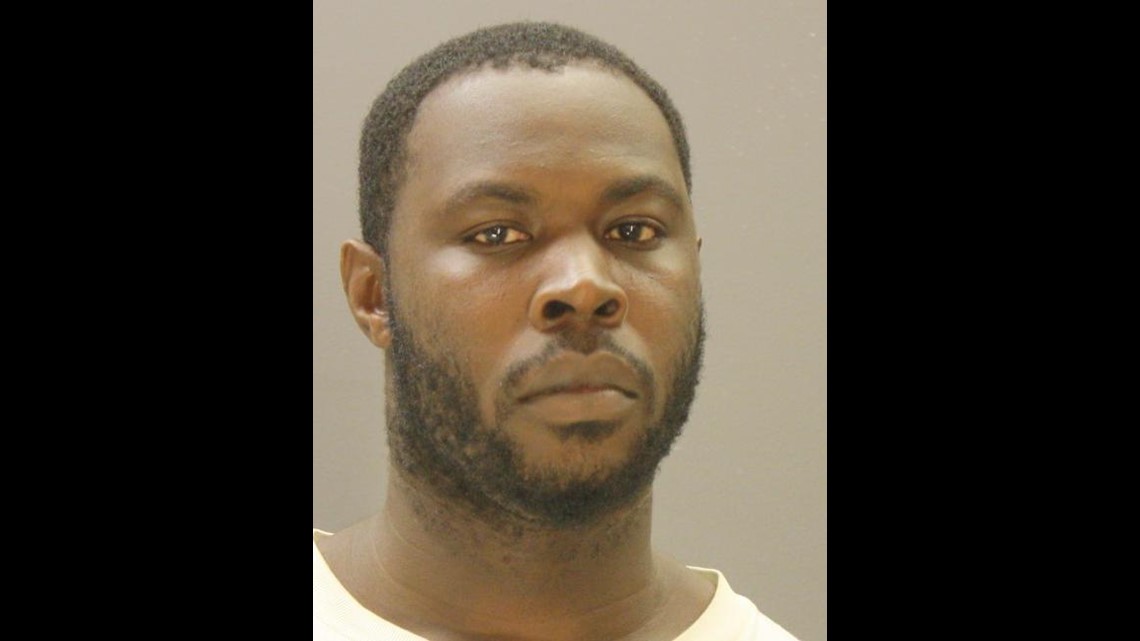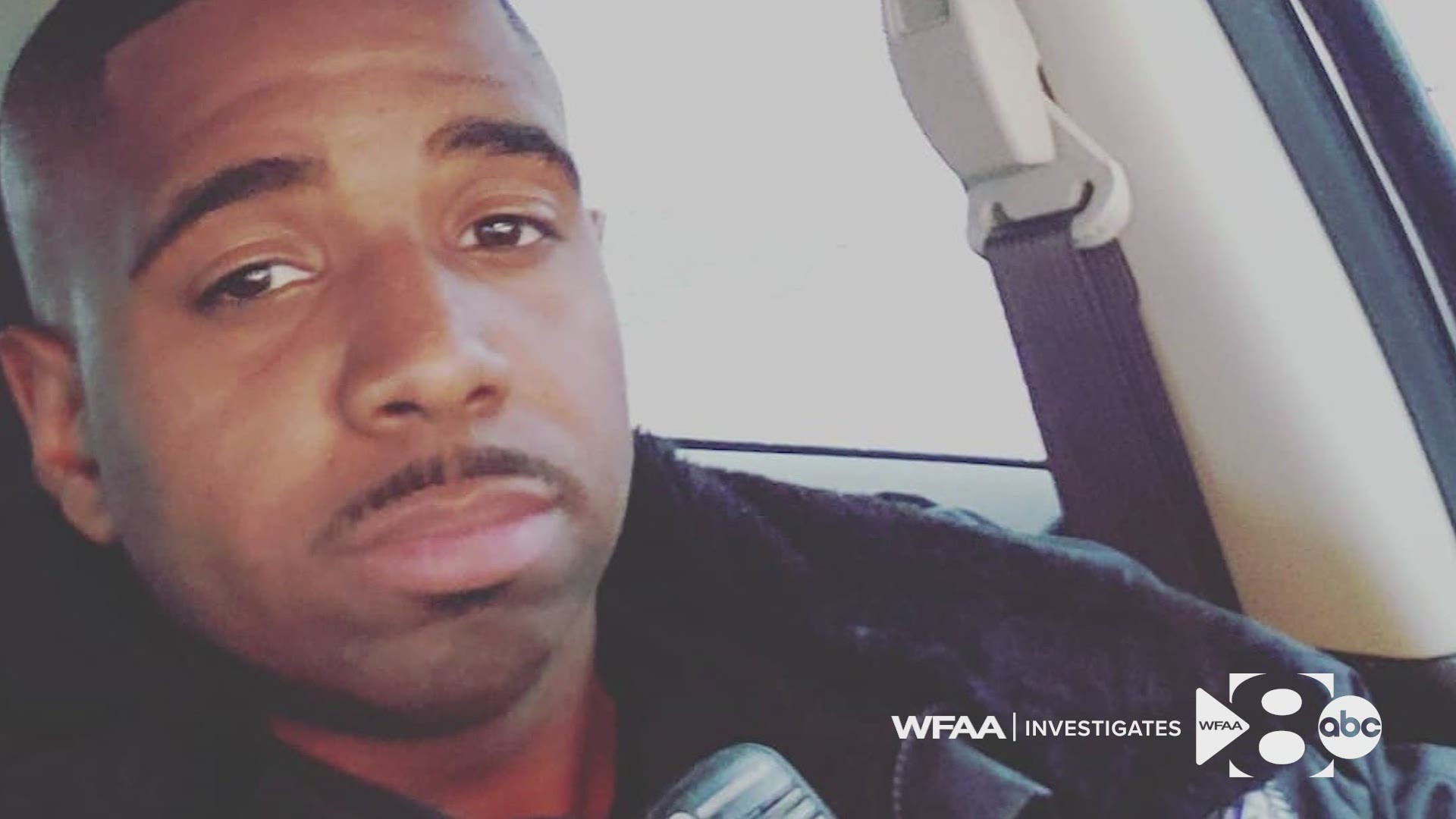DALLAS — Updated at 2:25 p.m. Wednesday after a court hearing.
Is former Dallas police officer Bryan Riser the mastermind of two killings? Or is he a victim of an elaborate tale spun by a convicted killer serving a life sentence?
Police say he’s the former.
His wife and attorney say Riser’s the latter.
“What they're saying is everything my husband is not,” Eboni Samuel Riser told WFAA.
His wife and attorney believe that banking records and other evidence they've gathered will be key to exonerating Riser. He is currently held in the Dallas County jail on two counts of capital murder. His bail is $5 million.
Dallas police Chief Eddie Garcia announced Riser’s arrest on March 4. The chief said investigators developed evidence that the 12-year veteran paid to have two people killed in 2017. He fired Riser a few days later.
In a hearing Wednesday, a judge ruled there was not enough probable cause in the case against Riser.
Arrest warrants show for Riser’s arrest shows police based much of their case on the word of Emmanuel Kilpatrick, a convicted killer.
WFAA learned Tuesday that Dallas police replaced the original warrants that they had taken to the judge to sign last month.
The most significant change in the new warrants has to do with records connected to Riser's cell phone, which police had used as evidence to connect him to the crimes, the documents showed.
RELATED: Dallas police replacing warrants against officer arrested on hitman-related capital murder charges
In the warrants that were originally submitted in March, officials said a preliminary analysis from the FBI "revealed that the suspect's cell phone placed him in or about the area during the time frame" of both victims' disappearances and subsequent killings.
But in the updated warrants, that was removed.
Instead, the warrants now claim the cell phone data analysis from the FBI shows Riser and Kilpatrick's cell phones were in the area where Kilpatrick says he met with Riser to "plan the kidnapping and murder" of the two victims. The original warrant also mentioned that Riser’s squad car was also shown to be in the area but the new warrant does not mention a squad car.
However, Riser’s attorney, Toby Shook, says these are significant changes and point to sloppy police work.
Dallas police have not explained the discrepancies between original warrants and the updated warrants.


Before his arrest last month, Riser lived in Grand Prairie with his wife of almost two years, his three children and her daughter. Eboni said they met through an online dating app about six years ago. She said he grew up in the neighborhood that he patrolled and wanted to be good example.
She said money was often tight, and Bryan worked overtime to pay for extra things for himself and the family. She said he certainly didn’t have disposable income to be paying for a hitman.
“It’s crazy,” she said. “I mean, absolutely farfetched crazy, almost laughable, if it wasn’t so serious.”


Killing spree
The events that culminated in Riser’s arrest began in March 2017.
Four people were killed in 48 hours: A father and son were tied up and shot to death in their apartment. A woman was abducted, shot to death and dumped in the Trinity River. A fourth man was shot to death as he tried to flee in his car.
Police told WFAA in 2017 that it was a scheme to lure “johns,” or men looking for prostitutes, so that they could be robbed. The sources said the woman, Lisa Saenz, was killed because the suspects were looking for someone to serve as a prostitute for their schemes. She was killed when she refused, the sources said then.
The accused triggerman was Emmanuel Kilpatrick, who invoked his right against self-incrimination and refused to talk to detectives in 2017. He didn’t tell police Riser had any involvement until more than two years later.
Court records show that suspicion would also turn to Riser’s father, Byron, who goes by the nickname, “Blue.” Saenz had lived with him.


On March 10, 2017, hours before she was killed, Saenz had been in a Dallas County courtroom. The father of her child was on trial for murder and had been convicted that day, according to court records.
The homicide investigator who went to the scene where Saenz’s body was found recognized her and that she was wearing the same clothes from when she was in court, according to police records.
What happened next was discussed in a detention hearing for Byron Riser in September 2017. He had been arrested on federal narcotics trafficking charges, and prosecutors were seeking to keep Byron Riser in custody by showing he was a danger to society.
A Dallas police narcotics detective testified in that hearing that on March 10, 2017, Saenz had been dropped off at Byron Riser’s home. She then left the apartment and was then abducted, killed and her body dumped in the Trinity River.
That detective also testified that Bryan Riser, the DPD officer, was considered a “subject” in the Saenz case, although he was vague about why.
During that Sept. 2017 hearing, the judge told prosecutors that he would not even consider the information about the Saenz murder because it was “too sketchy.”
Byron Riser has since pled guilty on the drug charges and is serving a federal prison sentence.
“I think police honed in on Bryan Riser because his father knew Lisa Saenz,” said Shook told WFAA.


Shook says detectives were also interested in Bryan Riser because two years earlier, in 2015, he had run a check on Saenz’s boyfriend, at her request, to see if he had any outstanding warrants.
Shook said his client knew Saenz, but not well.
In her interview, Eboni told WFAA that her husband had no clue that his father was dealing drugs. She says her husband’s father kept Bryan and his brother out of it since they were both in law enforcement. Bryan’s brother is a Dallas County sheriff’s deputy.
Kilpatrick’s claims
By August 2019, Kilpatrick had been in jail for more than two years. At the time, he was facing charges in four murders, including that of Lisa Saenz.
“He has every reason to lie and try to shift blame to someone else,” said Shook, Riser’s attorney.


Kilpatrick came forward with a story about Riser, his former high school classmate. Kilpatrick told detectives that Riser offered to provide intelligence on drug houses so that Kilpatrick and his crew could rob them.
But that drug house plan never came to be, Kilpatrick told detectives. Instead, Kilpatrick claims Riser wanted to hire him as a hitman. Kilpatrick told police that he and Riser met at a donut shop, and a park, to discuss a plan to abduct and kill a man named Albert Douglas for $3,500.
The updated warrants provided new details about the Douglas case. It says Douglas’ family members told police that he left on his bicycle on February 25, 2017 and never returned. Kilpatrick told investigators that he and an accomplice located Douglas a few days later, and that they killed him and dumped him in the Trinity River.
The updated warrants also say that Kilpatrick’s accomplice backed up his account, and that he admitted his role in the Douglas killing. It further says the accomplice picked Riser out of a lineup.
Shook told WFAA that Riser did not even know Douglas. “Why would he order him killed?” he said.
Neither the original warrants nor the newly obtained warrants provide an explanation.
Douglas’s body has never been found, but police believe he is dead.
The new warrants for Riser do not mention the accomplice’s name. However, a separate capital murder arrest warrant for Kevin Kidd shows that he is person listed as “accomplice #1.”
Kidd is also now charged in Douglas’ death. He already had two pending capital murder charges – one for the Saenz killing and for another killing.


Shook, a former longtime Dallas County prosecutor, said when his client was questioned by investigators, he was told that police had banking records backing up Kilpatrick’s claim that Riser was going to pay him $3,500 to kill Douglas.
“Obviously, they didn’t look at the actual documents,” Shook said.
He said Riser wrote a cashier’s check for $3,350 in February 2017 and gave it to a fraternity Riser joined. Shook provided WFAA a copy of the check.
He said his client is adamant that there were no other large cash withdrawals were made during that time.
According to the warrant, Kilpatrick claims that about two weeks after Douglas’ murder, Riser asked him to kill Saenz for $6,000. He says Riser told him that Saenz was an “informant.”
Kilpatrick told police he got arrested before he was paid.
Eboni, Riser's wife, told WFAA, that she knew the original warrants were wrong when they claimed that her husband was in the area when Saenz was killed.
She says he was the movies with her at the time. She also provided WFAA copies of the movie tickets.
Shook told WFAA that there was something else that didn’t make sense to him about the case.


Internal affairs records provided to WFAA show that, three days after Saenz was killed, Bryan Riser contacted homicide detective Timmy Stewart on March 13, 2017. In a voicemail, Riser told Stewart that he had received a call on his personal cell from “unknown male who told him he had gone to high school with him.” That person wanted to speak with a detective about the murder of the father and son that had occurred on March 11.
In the voicemail to Stewart, Riser left the phone number of the person who’d called him and said that he did not recognize the voice and that the person had refused to identify himself.
Detectives later determined that the phone number Riser left on the voice mail belonged to Kilpatrick.
The original warrant did not mention the Riser passed along the information to homicide. The new warrant contends that Riser “knew who the ‘unknown caller’ and (that it) appeared Suspect Riser attempted to deceive detectives by concealing his knowledge of who the caller was.”
Records show Riser provided the information to homicide prior to Kilpatrick’s arrest, record show.
“That's the last thing you would do If you were involved in planning out murders is give the hitman's phone number to the detective that's investigating the homicides,” Shook said.
After Riser’s arrest, Riser told a homicide detective and an FBI agent that he attended high school with Kilpatrick and worked with him at a skating rink more than a decade ago, according to internal affairs records.
He told investigators that he knew nothing about Kilpatrick’s criminal activity, and that he’d lost contact with Kilpatrick for a number of years until running into Kilpatrick at a donut shop. He said Kilpatrick was wearing a security jacket and told him he was working at an apartment complex.
Riser told investigators they exchanged numbers but he didn’t put Kilpatrick’s number in his cell phone contact list.
That internal investigation made much of the fact that Riser didn’t mention in his interview that he’d encountered Kilpatrick early one morning at another donut shop.
Shook says his client simply forgot about it given that four years had passed.
“He gave them the best memory he could of his interactions with Mr. Kilpatrick,” Shook said. “He got a few calls from him and there’s some texts, but there were no secret meetings. There was no planning for murders.”
Shook says these were merely chance encounters that have been spun into something they weren’t.
“A police officer at a donut shop isn’t necessarily a stunning fact,” he said. “Bryan obviously visited donut shops. You can look at his bank records.”
Internal investigators, who were looking to see if Riser had violated any DPD policies, wrapped up their investigation five days after Riser’s arrest.
They cited his arrest as “adverse conduct” in violation of department policies, and determined that he had been “untruthful” when he did not initially mention the second encounter with Kilpatrick at another donut shop.
Records show that Riser also acknowledged having left off his application that he had briefly worked at an ice cream warehouse about 15 years ago with his father.
Riser told investigators it wasn’t left off on purpose, and there was nothing in the investigation to indicate that was the case.
WFAA sent Chief Garcia a detailed list of questions about the investigation of Riser.
Garcia did not respond. Instead, a police department spokesman said in an email that the “the department will not comment further until the investigation is closed.”
Police have their theory. So does Shook.
“I think what happened in this case is a classic case of tunnel vision,” he said. “The lead detective goes to the scene and makes his mind up of how this murder occurred. And then he tries to fit all the facts to his theory. And when you do that, bad things happen.”
Eboni told WFAA her husband calls from the county jail twice a day.
She says in their conversations, her husband continually questions why detectives would believe Kilpatrick – the convicted murderer – over him.
But she said she believes the truth will set him free.
“The man that I know and love is not capable of doing anything like this,” she said. “And so I will do whatever it takes to make sure other people know that he's innocent man.”

